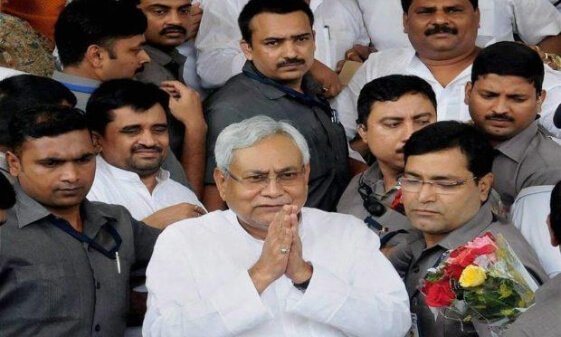Does Nitish’s Free Power Promise Before Polls Amount to Voter Coercion?
India’s Election System Lacks Checks on Long-Term Impact of Welfare Promises
July 18, 2025
Photo by BMN Network, via Creative Commons License
The promise made by Bihar Chief Minister Nitish Kumar to provide free electricity up to 125 units per month ahead of the Assembly elections invites serious scrutiny under both constitutional law and the principles of fair electoral practice. It raises the question of where to draw the line between legitimate welfare policy and unlawful inducement or voter coercion.
The legal test for what constitutes vote-buying or coercive inducement is not codified in one statute in India but can be interpreted through a combination of constitutional principles, electoral law and judgments from the Supreme Court.
Under Section 123(1) of the Representation of the People Act, 1951, a “corrupt practice” includes any gift, offer, or promise by a candidate or their agent of any gratification to induce a person to vote or refrain from voting. However, the law distinguishes between individual inducement and general policy promises.
General Policy vs. Targeted Bribes
Promises of welfare schemes made through formal budget announcements or party manifestos, such as free electricity, subsidised food or pensions, are often viewed as part of a party’s economic policy. The Supreme Court in “S. Subramaniam Balaji vs. State of Tamil Nadu” (2013) held that such promises, if made in an election manifesto and later implemented as public policy through budgetary allocation with legislative approval, do not per se amount to corrupt practices.
However, the Court also expressed concern about the ethical implications of “freebies” that distort voter choice and suggested that guidelines must be framed to distinguish policy from inducement.
The concern is that such promises can effectively reduce elections to transactions, where votes are exchanged for promised handouts. In this setup, political competition becomes a race to offer the most attractive giveaways, rather than a contest of ideas, policies or institutional reform. For poorer or more vulnerable voters, especially, these offers can feel like economic lifelines, pressuring them to vote in a particular way out of necessity rather than conviction.
This kind of distortion does not always involve direct coercion or bribery, but it creates a dependency dynamic. It also weakens accountability, because once in power, a government may focus more on delivering giveaways than investing in education, health, infrastructure or jobs, all of which have long-term value but may not yield immediate electoral returns.
Such freebies can also serve as a political smokescreen, diverting public attention from a party’s failures in governance. Instead of being held accountable for gaps in infrastructure, poor service delivery, rising unemployment, or corruption, a ruling party can use last-minute welfare announcements to reset the narrative. Further, these promises project the party as generous and pro-poor, even if its actual record shows administrative neglect or financial mismanagement.
The Election Commission of India (ECI), though constitutionally empowered to ensure free and fair elections under Article 324, has so far refrained from categorically banning welfare promises unless they are specific, individualised or tied directly to voting behaviour. This leaves a wide grey area where political parties can announce fiscally irresponsible schemes without facing legal consequences.
Need for Institutional Review
India’s election system does not have strong safeguards to examine the long-term impact of such promises. Bodies like the Finance Commission, the Election Commission, and even the courts have mostly stayed away unless there is a clear link between the promise and a vote in return. But when welfare promises strain the state’s capital budget and increase its debt, they can be seen as a misuse of public funds to win elections.
While the promise of free electricity may not count as illegal coercion under current law, it raises serious concerns. It reflects a kind of populist politics that takes advantage of the lack of clear rules. This deserves debate among the public about whether India needs stronger measures to check the use of public money for election-time promises that can pressure voter choice.
It is also important to recognise that Nitish Kumar is not an exception. He is operating within an existing political culture in which most major parties regularly announce welfare schemes ahead of elections. The Aam Aadmi Party (AAP) has built its electoral strategy around promises of free electricity and water in Delhi and Punjab. The Congress party in Karnataka offered 200 units of free power to households through the “Gruha Jyothi” scheme, along with other pre-poll guarantees. The Bharatiya Janata Party (BJP) has promised cash transfers and subsidies in several state elections, including in Madhya Pradesh and Uttar Pradesh.
Competitive populism has become a common feature of Indian elections, where the use of public funds to influence voter behaviour is now routine. The real issue is with an entrenched practice across the political spectrum that blurs the line between welfare policy and electoral inducement.
You have just read a News Briefing by Newsreel Asia, written to cut through the noise and present a single story for the day that matters to you. Certain briefings, based on media reports, seek to keep readers informed about events across India, others offer a perspective rooted in humanitarian concerns and some provide our own exclusive reporting. We encourage you to read the News Briefing each day. Our objective is to help you become not just an informed citizen, but an engaged and responsible one.

